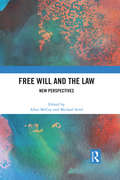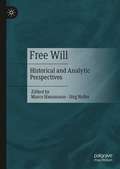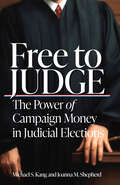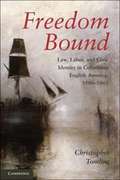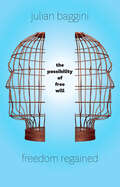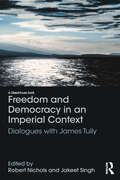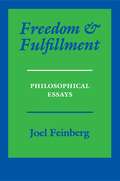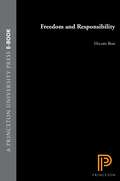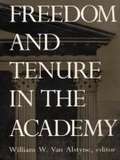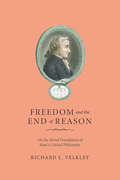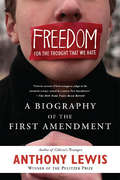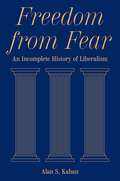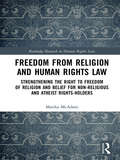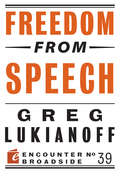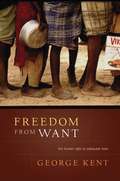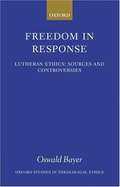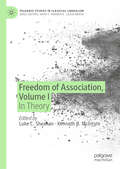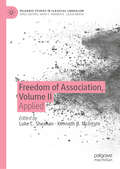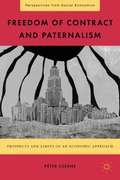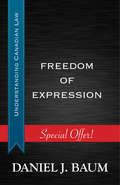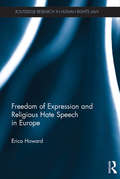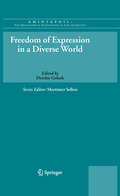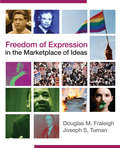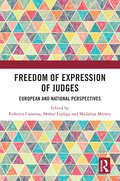- Table View
- List View
Free Will and the Law: New Perspectives
by Allan McCay Michael SevelThis volume brings together many of the world’s leading theorists of free will and philosophers of law to critically discuss the ground-breaking contribution of David Hodgson’s libertarianism and its application to philosophy of law. The book begins with a comprehensive introduction, providing an overview of the intersection of theories of free will and philosophy of law over the last fifty years. The eleven chapters collected together divide into two groups: the first five address libertarianism within the free will debate, with particular attention to Hodgson’s theory, and in Part II, six contributors discuss Hodgson’s libertarianism in relation to issues not often pursued by free will scholars, such as mitigation of punishment, the responsibility of judges, the nature of judicial reasoning and the criminal law process more generally. Thus the volume’s importance lies not only in examining Hodgson’s distinctive libertarian theory from within the free will literature, but also in considering new directions for research in applying that theory to enduring questions about legal responsibility and punishment.
Free Will: Historical and Analytic Perspectives
by Jörg Noller Marco HausmannThis novel contributed volume advances the current debate on free will by bridging the divide between analytic and historically oriented approaches to the problem. With thirteen chapters by leading academics in the field, the volume is divided into three parts: free will and determinism, free will and indeterminism, and free will and moral responsibility. The contributors aim to initiate a philosophical discourse that profits from a combination of the two approaches. On the one hand, the analytic tools familiar from the debate – arguments, concepts, and distinctions – can be used to sharpen our understanding of classical philosophical positions. On the other hand, the rich philosophical tradition can be reconstructed so as to inspire new solutions. In recent years, the problem of free will has received special attention in the analytic arena. This is the first anthology to combine historical and analytic perspectives, significantly furthering the debate, and providing a crucial resource to academics and advanced students alike.
Free to Judge: The Power of Campaign Money in Judicial Elections
by Michael Kang Joanna ShepherdThe idea that wealthy people use their money to influence things, including politics, law, and media will surprise very few people. However, as Michael S. Kang and Joanna Shepherd argue in this readable and rich study of the state judiciary, the effect of money on judicial outcomes should disturb and anger everyone. In the current system that elects state judges, the rich and powerful can spend money to elect and re-elect judges who decide cases the way they want. Free to Judge is about how and why money increasingly affects the dispensation of justice in our legal system, and what can be done to stop it. One of the barriers to action in the past has been an inability to prove that campaign donations influence state judicial decision-making. In this book, Kang and Shepherd answer that challenge for the first time, with a rigorous empirical study of campaign finance and judicial decision-making data. Pairing this with interviews of past and present judges, they create a compelling and persuasive account of people like Marsha Ternus, the first Iowa state supreme court justice to be voted out of office after her decision in a same-sex marriage case. The threat of such an outcome, and the desire to win reelection, results in judges demonstrably leaning towards the interests and preferences of their campaign donors across all cases. Free to Judge is thus able to identify the pieces of our current system that invite bias, such as judicial reelection, and what reforms should focus on. This thoughtful and compellingly written book will be required reading for anybody who cares about creating a more just legal system.
Freedom Bound: Law, Labor, and Civic Identity in Colonizing English America, 1580-1865
by Christopher TomlinsFreedom Bound is about the origins of modern America - a history of colonizing, work, and civic identity from the beginnings of English presence on the mainland until the Civil War. It is a history of migrants and migrations, of colonizers and colonized, of households and servitude and slavery, and of the freedom all craved and some found. Above all it is a history of the law that framed the entire process. Freedom Bound tells how colonies were planted in occupied territories, how they were populated with migrants - free and unfree - to do the work of colonizing, and how the newcomers secured possession. It tells of the new civic lives that seemed possible in new commonwealths, and of the constraints that kept many from enjoying them. It follows the story long past the end of the eighteenth century until the American Civil War, when - just for a moment - it seemed that freedom might finally be unbound.
Freedom Bound: Law, Labor, and Civic Identity in Colonizing English America, 1580–1865
by Christopher TomlinsFreedom Bound is about the origins of modern America - a history of colonizing, work and civic identity from the beginnings of English presence on the mainland until the Civil War. It is a history of migrants and migrations, of colonizers and colonized, of households and servitude and slavery, and of the freedom all craved and some found. Above all it is a history of the law that framed the entire process. Freedom Bound tells how colonies were planted in occupied territories, how they were populated with migrants - free and unfree - to do the work of colonizing and how the newcomers secured possession. It tells of the new civic lives that seemed possible in new commonwealths and of the constraints that kept many from enjoying them. It follows the story long past the end of the eighteenth century until the American Civil War, when - just for a moment - it seemed that freedom might finally be unbound.
Freedom Regained: The Possibility of Free Will
by Julian Baggini“For anyone who has ever given serious thought to the degree to which our actions are within our own control, Freedom Regained will give you a lot to chew on.” —Spectrum CultureIt’s a question that’s puzzled philosophers and theologians for centuries and is at the heart of numerous political, social, and personal concerns: Do we have free will? In this cogent, compelling book, Julian Baggini explores the concept of free will from every angle, blending philosophy, sociology, and cognitive science to find rich new insights on the intractable questions that plague us. Are we products of our culture, or free agents within it? Are our neural pathways fixed early on by a mix of nature and nurture, or is the possibility of comprehensive, intentional psychological change always open to us? And what, exactly, are we talking about when we talk about “freedom” anyway?Freedom Regained brings the issues raised by the possibilities—and denials—of free will to thought-provoking life, drawing on scientific research and fascinating encounters with everyone from artists to prisoners to dissidents. Baggini looks at what it means to be material beings in a universe of natural laws. He asks if there’s any difference between ourselves and the brains from which we seem never able to escape. He throws down the wild cards and plays them to the fullest: What about art? What about addiction? What about twins? And he asks, of course, what this all means for politics.Ultimately, Baggini challenges those who think free will is an illusion. Moving from doubt to optimism to a hedged acceptance of free will, he ultimately lands on a satisfying conclusion: It is something we earn. The result is a highly engaging, new, and more positive understanding of our sense of personal freedom, a freedom that is definitely worth having.“Entertaining.” —The Wall Street Journal“While firmly rooted in the philosophical tradition, Baggini also gets out and talks to people for whom freedom—and lack of it—is a real and pressing matter.” —Literary Review
Freedom and Democracy in an Imperial Context: Dialogues with James Tully
by Robert Nichols Jakeet SinghFreedom and Democracy in an Imperial Context: Dialogues with James Tully gathers leading thinkers from across the humanities and social sciences in a celebration of, and critical engagement with, the recent work of Canadian political philosopher James Tully. Over the past thirty years, James Tully has made key contributions to some of the most pressing questions of our time, including: interventions in the history of moral and political thought, contemporary political philosophy, democracy, citizenship, imperialism, recognition and cultural diversity. In 2008, he published Public Philosophy in a New Key, a two-volume work that promises to be one of the most influential and important statements of legal and political thought in recent history. This work, along with numerous other books and articles, is foundational to a distinctive school of political thought, influencing thinkers in fields as diverse as Anthropology, History, Indigenous Studies, Law, Philosophy and Political Science. Critically engaging with James Tully’s thought, the essays in this volume take up what is his central, and ever more pressing, question: how to enact democratic practices of freedom within and against historically sedimented and actually existing relationships of imperialism?
Freedom and Fulfillment: Philosophical Essays
by Joel FeinbergDealing with a diverse set of problems in practical and theoretical ethics, these fourteen essays, three of them previously unpublished, reconfirm Joel Feinberg's leading position in the field of legal philosophy. With a clarity and humor that will be familiar to readers of his other works, Feinberg writes on topics including "wrongful life" suits in the law of torts, or whether there is any sense in the remark that a person is so badly off that he would be better off not existing at all; the morality of abortion; educational options; free expression; civil disobedience; and the duty of easy rescue in criminal law. He continues with a three-part defense of moral rights in the abstract, a discussion of voluntary euthanasia, and an inquiry into arguments of various kinds for not granting legal rights in enforcement of a person's acknowledged moral rights. This collection concludes with two essays dealing with concepts used in appraising the whole of a person's life: absurdity and self-fulfillment, and their interplay.
Freedom and Responsibility
by Hilary BokCan we reconcile the idea that we are free and responsible agents with the idea that what we do is determined according to natural laws? For centuries, philosophers have tried in different ways to show that we can. Hilary Bok takes a fresh approach here, as she seeks to show that the two ideas are compatible by drawing on the distinction between practical and theoretical reasoning.Bok argues that when we engage in practical reasoning--the kind that involves asking "what should I do?" and sifting through alternatives to find the most justifiable course of action--we have reason to hold ourselves responsible for what we do. But when we engage in theoretical reasoning--searching for causal explanations of events--we have no reason to apply concepts like freedom and responsibility. Bok contends that libertarians' arguments against "compatibilist" justifications of moral responsibility fail because they describe human actions only from the standpoint of theoretical reasoning. To establish this claim, she examines which conceptions of freedom of the will and moral responsibility are relevant to practical reasoning and shows that these conceptions are not vulnerable to many objections that libertarians have directed against compatibilists. Bok concludes that the truth or falsity of the claim that we are free and responsible agents in the sense those conceptions spell out is ultimately independent of deterministic accounts of the causes of human actions.Clearly written and powerfully argued, Freedom and Responsibility is a major addition to current debate about some of philosophy's oldest and deepest questions.
Freedom and Tenure in the Academy
by William W. Van AlstyneQuestions of academic freedom--from hate speech to the tenure structure--continue to be of great urgency and perennial debate in American higher education. Originally published as a special issue of Law and Contemporary Problems (Summer 1990), this volume draws together leading scholars of law, philosophy, and higher education to offer a fresh assessment of the founding principles of academic freedom and to define this crucial topic for the 1990s. The original 1940 Statement of Principles on Academic Freedom and Tenure, which has been influential in determining institutional practices for the last half century, has required continual redefinition since its initial declaration. The volume begins with two overview articles: the most complete examination of the 1940 Statement ever provided (shedding light on some of its most troublesome clauses) and a historical review of the extent to which academic freedom has been accepted into domestic constitutional law. Subsequent articles address a range of issues related to academic freedom: the relationship between tenure and academic freedom; tenure and labor law; ideology and faculty selection; freedom of expression and the arts on campus; the boundaries defining hate speech and offensive expression; the clash between institutional and individual claims of academic freedom; and the practices of religious colleges in the United States.Contributors. Ralph S. Brown, Matthew W. Finkin, Jordan E. Kurland, Michael W. McConnell, Walter P. Metzger, Robert M. O'Neil, David M. Rabban, Rodney A, Smolla, Janet Sinder, Judith Jarvis Thomson, William W. Van Alstyne
Freedom and the End of Reason: On the Moral Foundation of Kant's Critical Philosophy
by Richard L. VelkleyIn Freedom and the End of Reason, Richard L. Velkley offers an influential interpretation of the central issue of Kant’s philosophy and an evaluation of its position within modern philosophy’s larger history. He persuasively argues that the whole of Kantianism#151;not merely the Second Critique#151;focuses on a #147;critique of practical reason” and is a response to a problem that Kant saw as intrinsic to reason itself: the teleological problem of its goodness. Reconstructing the influence of Rousseau on Kant’s thought, Velkley demonstrates that the relationship between speculative philosophy and practical philosophy in Kant is far more intimate than generally has been perceived. By stressing a Rousseau-inspired notion of reason as a provider of practical ends, he is able to offer an unusually complete account of Kant’s idea of moral culture.
Freedom for the Thought That We Hate: A Biography of the First Amendment
by Anthony LewisMore than any other people on earth, we Americans are free to say and write what we think. The press can air the secrets of government, the corporate boardroom, or the bedroom with little fear of punishment or penalty. This extraordinary freedom results not from America’s culture of tolerance, but from fourteen words in the constitution: the free expression clauses of the First Amendment. In Freedom for the Thought That We Hate, two-time Pulitzer Prize-winner Anthony Lewis describes how our free-speech rights were created in five distinct areas--political speech, artistic expression, libel, commercial speech, and unusual forms of expression such as T-shirts and campaign spending. It is a story of hard choices, heroic judges, and the fascinating and eccentric defendants who forced the legal system to come face to face with one of America’s great founding ideas.
Freedom from Fear: An Incomplete History of Liberalism
by Alan S. KahanA provocative new history of liberalism that also provides a road map for today’s liberalsFreedom from Fear offers a striking new account of the dominant political and social theory of our time: liberalism. In a pathbreaking reframing of the historical debate, Alan Kahan charts the development of Western liberalism from the late eighteenth century to the present. Examining key liberal thinkers and issues, Kahan shows how liberalism is both a response to fear and a source of hope: the search for a world in which no one need be afraid.Freedom from Fear reveals how liberal arguments typically rely on three pillars: freedom, markets, and morals. But when liberals ignore one or more of these pillars, their arguments generally fail to persuade. Extending from Adam Smith and Montesquieu to today’s battles between liberals and populists, the book examines the twists and turns of the “incomplete” or unfinished liberal tradition while demonstrating its fundamental continuity. It combines fresh accounts of familiar figures such as Tocqueville and Rawls with discussions of less-famous but pivotal thinkers such as A. V. Dicey and Jane Addams, and explores how liberals have dealt with crucial issues, from debates over male and female suffrage to colonialism and liberal anti-Catholicism.By transforming our understanding of the history of liberal thought and practice, Freedom from Fear provides a new picture of the political creed today: the paths liberals need to follow, the questions they need to answer, and the dead ends they must avoid—if they are to win.
Freedom from Religion and Human Rights Law: Strengthening the Right to Freedom of Religion and Belief for Non-Religious and Atheist Rights-Holders (Routledge Research in Human Rights Law)
by Marika McAdamAlthough human rights belong to all persons on the basis of their humanity, this book demonstrates that in the practice of international human rights law, the freedom to be non-religious or atheist does not receive the same protection as the freedom to be religious. Despite the claimed universality of freedom of religion and belief contained in article 18 of the International Covenant on Civil and Political Rights, the key assertion made is that there is a hierarchy of religion and belief, with followers of major established religions enjoying high protection and low regulation at the top, and atheists and non-believers enduring high persecution and weaker protection at the bottom. The existence of this hierarchy is proven and critiqued through three case study chapters that respectively explore the extent to which non-religious and atheist rights-holders enjoy freedom from proselytism, freedom from hate and freedom from the religions of their parents.
Freedom from Speech
by Greg LukianoffThis is a surreal time for freedom of speech. While the legal protections of the First Amendment remain strong, the culture is obsessed with punishing individuals for allegedly offensive utterances. And academia - already an institution in which free speech is in decline - has grown still more intolerant, with high-profile "disinvitation" efforts against well-known speakers and demands for professors to provide "trigger warnings" in class. In this Broadside, Greg Lukianoff argues that the threats to free speech go well beyond political correctness or liberal groupthink. As global populations increasingly expect not just physical comfort but also intellectual comfort, threats to freedom of speech are only going to become more intense. To fight back, we must understand this trend and see how students and average citizens alike are increasingly demanding freedom from speech.
Freedom from Want: The Human Right to Adequate Food (Advancing Human Rights)
by George KentThere is, literally, a world of difference between the statements "Everyone should have adequate food," and "Everyone has the right to adequate food." In George Kent's view, the lofty rhetoric of the first statement will not be fulfilled until we take the second statement seriously. Kent sees hunger as a deeply political problem. Too many people do not have adequate control over local resources and cannot create the circumstances that would allow them to do meaningful, productive work and provide for themselves. The human right to an adequate livelihood, including the human right to adequate food, needs to be implemented worldwide in a systematic way. Freedom from Want makes it clear that feeding people will not solve the problem of hunger, for feeding programs can only be a short-term treatment of a symptom, not a cure. The real solution lies in empowering the poor. Governments, in particular, must ensure that their people face enabling conditions that allow citizens to provide for themselves.
Freedom in Response: Sources and Controversies
by Oswald BayerThe leitmotif of Freedom in Response, as the title suggests, is a reasoned exposition of the nature of freedom, as it is presented in the Bible and developed by such later theologians as Martin Luther.
Freedom of Association, Volume I: In Theory (Palgrave Studies in Classical Liberalism)
by Kenneth B. McIntyre Luke C. SheahanThis two-volume set addresses freedom of association, one of the central liberties associated with classical liberalism. The concept of freedom of association has been largely neglected by political and moral philosophers over the past several centuries, despite the fact that the freedom to associate with fellow citizens (and non-citizens) is an implication of almost every version of liberalism capaciously considered. These two volumes take freedom of association seriously both as a theoretical concept and as an integral part of any genuine liberal regime. This first volume considers freedom of association from a theoretical perspective. It considers the freedom of association in conversation with negative liberty, moral pluralism, communitarianism, polycentric democracy, and republicanism.
Freedom of Association, Volume II: Applied (Palgrave Studies in Classical Liberalism)
by Kenneth B. McIntyre Luke C. SheahanThis two-volume set addresses freedom of association, one of the central liberties associated with classical liberalism. The concept of freedom of association has been largely neglected by political and moral philosophers over the past several centuries, despite the fact that the freedom to associate with fellow citizens (and non-citizens) is an implication of almost every version of liberalism capaciously considered. These two volumes take freedom of association seriously both as a theoretical concept and as an integral part of any genuine liberal regime. This second volume considers freedom of association from an applied perspective. It considers the freedom of association in conversation with various theorists (including Hobbes, Locke, Rousseau, and Tocqueville) and in the context of specific case studies.
Freedom of Contract and Paternalism: Prospects and Limits of an Economic Approach (Perspectives from Social Economics)
by Péter CserneA theoretical discussion and internal critique of mainstream law and economics scholarship, especially as it approaches the issue of paternalism. Cserne discusses how, and to what extent, economic analysis can explain and/or justify the limitations on freedom of contract, with special emphasis on paternalism.
Freedom of Expression
by Daniel J. BaumThis book explains our right to freedom of expression, its limits, and how Canadian courts draw the line. Freedom of expression is a fundamental right protected by the Charter of Rights and Freedoms, which is part of the Constitution of Canada and, as such, the highest law of the land. But it has limits. Peacefully picketing an abortion clinic, so long as patients can come and go, is a protected right, but shouting "Fire!" in a crowded theatre to cause a stampede is a criminal offence. Tied in with issues of free speech are questions such as whether justice delayed is justice denied. If it takes years to bring a matter to court — and especially to the Supreme Court of Canada — how can it be said that there has been a fair consideration of the issues to be decided? As well, must all important constitutional questions, such as freedom of expression, be decided by the courts? Or, is there another way to resolve such issues? How courts reach decisions in such cases is discussed in Freedom of Expression, an objective introduction for all readers to better understand how law and professional ethics impact those of us who would speak publicly as to issues of concern.
Freedom of Expression and Religious Hate Speech in Europe (Routledge Research in Human Rights Law)
by Erica HowardIn recent years, the Danish cartoons affair, the Charlie Hebdo murders and the terrorist attacks in Brussels and Paris have resulted in increasingly strident anti-Islamic speeches by politicians. This raises questions about the limits to freedom of expression and whether this freedom can and should be restricted to protect the religious feelings of believers. This book uses the case law of the European Court of Human Rights to provide a comprehensive analysis of the questions: whether legal prohibitions of religious hate speech violate the right to freedom of expression; and, whether such laws should be used to prosecute politicians and others who contribute to current debates when they use anti-Islam rhetoric. A well-known politician who uses such rhetoric is Dutch politician Geert Wilders. He has been prosecuted twice for hate speech, and was acquitted in the first case and recently convicted in the second. These prosecutions are used to illustrate the issues involved in drawing the line between freedom of expression and religious hate speech. The author argues that freedom of expression of politicians and those contributing to the public debate should not be restricted except in two very limited circumstances: when they incite to hatred or violence and there is an imminent danger that violence will follow or where it stops people from holding or manifesting their religion. Based on this, the author concludes that the European Court of Human Rights should decide, if it is asked to do so, that Wilders conviction for hate speech violates his freedom of expression.
Freedom of Expression in a Diverse World
by Deirdre GolashThe debate over the foundations and boundaries of freedom of speech, once a matter of balancing the individual rights of unpopular speakers against broader social interests, took on a new shape in the 1980s when feminists began to advocate restrictions on pornography and critical race theorists to advocate restriction of certain kinds of hate speech. These challenges to traditional liberalism brought into sharp focus the issues of why we value free speech and how much weight it should be given against competing values. Difficult as it is to resolve these issues domestically, we now face new challenges arising from the increasingly rapid dissemination of information across international borders in an atmosphere of considerable political tension. The riots in response to the publication of Danish cartoons ridiculing Mohammed and the death threats against Salman Rushdie indicate how dramatically the stakes have been raised. At the same time, there is increased concern over discriminatory treatment of sexual minorities, Muslims, and immigrants. Against this background, the essays in this volume seek to illuminate why we value freedom of speech and expression and how this freedom can be weighed against other values, such as multicultural sensitivity, the rights of racial and sexual minorities, and the prevention of violence, both domestically and internationally.
Freedom of Expression in the Marketplace of Ideas
by Joseph S. Tuman Dr Douglas FraleighA comprehensive guide to effective participation in the public debate about our most indispensable right: freedom of expressionEncouraging readers to think critically about freedom of speech and expression and the diverse critical perspectives that challenge the existing state of the law, this text provides a comprehensive analysis of the historical and legal contexts of the First Amendment, from its early foundations all the way to censorship on the Internet. Throughout the book, authors Douglas M. Fraleigh and Joseph S. Tuman use the "Marketplace of Ideas" metaphor to help readers visualize a world where the exchange of ideas is relatively unrestrained and self-monitored. The text provides students with the opportunity to read significant excerpts of landmark decisions and to think critically about the issues and controversies raised in these cases. Students will appreciate the treatment of contemporary issues, including free speech in a post-9/11 world, free expression in cyberspace, and First Amendment rights on college campuses. Features: Demystifies free speech law, encouraging readers to grapple with the complexities of significant ethical and legal issues Sparks student interest in "big picture" issues while simultaneously covering important foundational material, including incitement, fighting words, true threats, obscenity, indecency, child pornography, hate speech, time place and manner restrictions, symbolic expression, restrictions on the Internet, and terrorism. Includes significant excerpts from landmark freedom of expression cases, including concurring or dissenting opinions where applicable, to help students become active learners of free expression rights Offers critical analysis and alternative perspectives on free expression doctrines to demonstrate that existing doctrine is not necessarily ideal or immutable Includes a global perspective on free expression including a chapter on international and comparative perspectives that helps students see how the values of different cultures influence judicial decisions
Freedom of Expression of Judges: European and National Perspectives
by Federica Casarosa, Mohor Fajdiga and Madalina MoraruThis book addresses the impact of developments surrounding the freedom of expression of judges by building on the experience of judges themselves, legal practitioners and academics across Europe. Like everybody, judges enjoy freedom of expression. However, historically, there have been starker limitations to the free speech of judges compared to ordinary citizens, the rationale being to safeguard judicial independence, impartiality and public trust in the judiciary. Where exactly the boundary lies is a highly complex question. The recent developments in Europe have rekindled the dilemma of guaranteeing freedom of expression to judges. The rule of law crisis has led many judges to speak out against the attacks of autocratic governments targeting judges and courts. The rapid expansion of the digital world has opened up new channels of communication, and the growing role of courts in society has expanded the reach of courts to practically any social issue, even the most polarised. This work critically analyses the recent jurisprudence of the Court of Justice of the EU and the European Court of Human Rights, its reception at the national level and the contribution of national judiciaries to the discussion pervading the European judicial space. It seeks to raise awareness that judicial speech is a multifaceted phenomenon shaped by complex legal and social considerations worth further exploration. The book will be of interest to academics, researchers, and policy-makers working in the areas of Human Rights Law, Constitutional Law and Politics, and Comparative Law.
